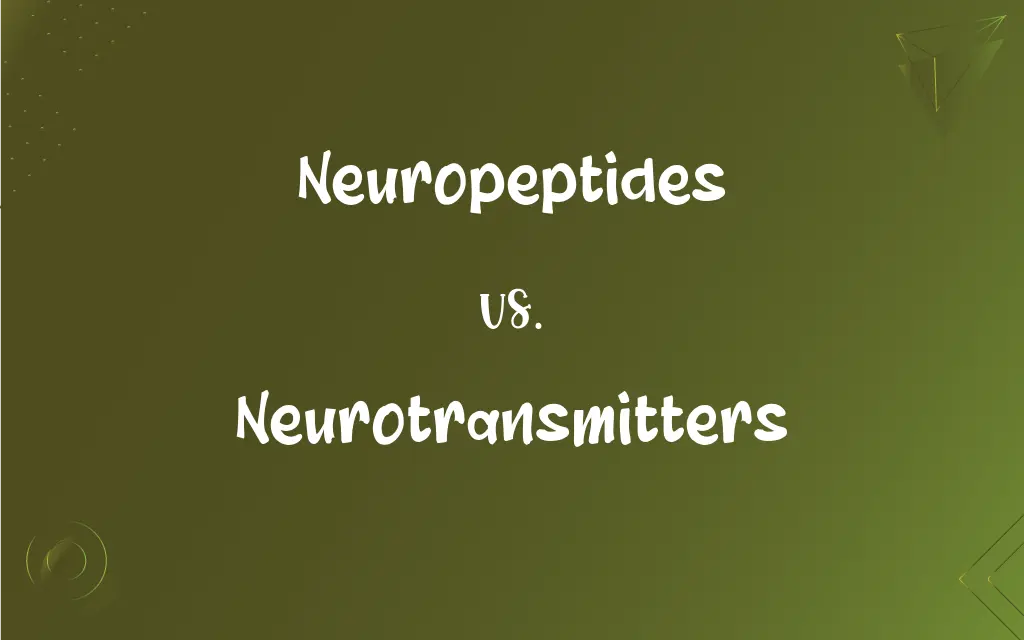Neuropeptides vs. Neurotransmitters: What's the Difference?
Edited by Aimie Carlson || By Harlon Moss || Published on January 10, 2024
Neuropeptides are larger, complex molecules acting as signaling agents in the nervous system, while neurotransmitters are smaller chemicals transmitting signals across neural synapses.

Key Differences
Neuropeptides are relatively large and complex molecules made up of amino acids, functioning as important signaling molecules in the nervous system. Neurotransmitters, in contrast, are smaller, simpler chemical messengers that transmit signals across a synapse from one neuron to another.
The synthesis of neuropeptides involves a precursor protein that is processed and modified into the active neuropeptide. Neurotransmitters, on the other hand, are often synthesized from relatively simple precursors and are stored in synaptic vesicles ready for rapid release.
Neuropeptides typically act slower than neurotransmitters, modulating neuronal activity over a longer period. Neurotransmitters quickly relay signals between neurons, enabling rapid communication within the nervous system.
In terms of function, neuropeptides often play roles in regulating complex processes like mood, appetite, and pain. Neurotransmitters are crucial for basic neuronal functions, including muscle contraction, heart rate, and conscious thought.
Neuropeptides, due to their size and complexity, have a broader range of action and can affect multiple receptor types. Neurotransmitters typically have a more targeted and specific action at the synapse.
ADVERTISEMENT
Comparison Chart
Size and Complexity
Larger, complex molecules made of amino acids
Smaller, simpler chemical messengers
Synthesis
From precursor proteins
From simple precursors, stored in vesicles
Speed of Action
Slower, modulating neuronal activity over time
Rapid, enabling quick signal transmission
Functional Role
Regulate complex processes like mood, appetite
Crucial for basic neuronal functions
Range of Action
Broader, affecting multiple receptor types
More targeted, specific action at synapses
ADVERTISEMENT
Neuropeptides and Neurotransmitters Definitions
Neuropeptides
They are produced from larger precursor proteins in neurons.
The neuropeptide substance P is involved in transmitting pain signals.
Neurotransmitters
Neurotransmitters are chemicals that transmit signals across a synapse.
Serotonin, a neurotransmitter, is vital for mood regulation.
Neuropeptides
Neuropeptides modulate various physiological processes in the body.
Neuropeptides like ghrelin regulate appetite.
Neurotransmitters
Neurotransmitters are involved in a range of brain functions.
Glutamate, a major excitatory neurotransmitter, is essential for cognitive functions.
Neuropeptides
Neuropeptides are chains of amino acids functioning as signaling molecules.
Endorphins, a type of neuropeptide, play a key role in pain relief.
Neurotransmitters
They are synthesized in the neuron and stored in synaptic vesicles.
Dopamine, a neurotransmitter, is involved in reward and pleasure mechanisms.
Neuropeptides
Neuropeptides can influence multiple neurons and brain regions.
Neuropeptides are implicated in the regulation of mood and stress.
Neurotransmitters
Neurotransmitters enable rapid communication between neurons.
Acetylcholine acts as a neurotransmitter at neuromuscular junctions.
Neuropeptides
They act on a wide range of receptors, often slowly and over a longer duration.
Oxytocin, a neuropeptide, influences social bonding and reproduction.
Neurotransmitters
They bind to specific receptors on the post-synaptic neuron.
GABA, an inhibitory neurotransmitter, helps reduce neuronal excitability.
Neuropeptides
Any of various short-chain peptides found in brain tissue, such as endorphins.
Neurotransmitters
A chemical substance, such as acetylcholine or dopamine, that transmits nerve impulses across a synapse.
Neuropeptides
Plural of neuropeptide
Neurotransmitters
Plural of neurotransmitter
FAQs
What types of physiological processes do neuropeptides regulate?
Processes like mood, appetite, pain, and stress.
What are neuropeptides?
Chains of amino acids that act as signaling molecules in the nervous system.
Are neuropeptides stored in synaptic vesicles?
No, they are synthesized as needed from larger precursor proteins.
How are neuropeptides synthesized?
From larger precursor proteins in the neuron.
Do neurotransmitters have a specific action?
Yes, they typically bind to specific receptors on the post-synaptic neuron.
How fast do neurotransmitters act?
They act rapidly, allowing for quick signal transmission.
Can neuropeptides affect multiple neurons?
Yes, they often have a broader range of action.
Can neuropeptides act quickly like neurotransmitters?
Generally, they act slower than neurotransmitters.
Can neuropeptides be classified as neurotransmitters?
They are a specialized type of signaling molecule, distinct from classic neurotransmitters.
How do neurotransmitters function?
They transmit signals across neural synapses, enabling communication between neurons.
How do neuropeptides influence mood?
By modulating neuronal activity in brain regions associated with mood.
What is the role of neurotransmitters in the brain?
They are crucial for various brain functions including learning, memory, and emotion.
How does the complexity of neuropeptides compare to neurotransmitters?
Neuropeptides are more complex, consisting of longer chains of amino acids.
Can neurotransmitters influence muscle movement?
Yes, neurotransmitters like acetylcholine are crucial in muscle contraction.
What is a common neurotransmitter involved in mood regulation?
Serotonin is a well-known neurotransmitter affecting mood.
Are neuropeptides involved in pain regulation?
Yes, certain neuropeptides play a key role in pain signaling pathways.
Do neurotransmitters only act in the central nervous system?
They act both in the central and peripheral nervous systems.
What makes neurotransmitters different from hormones?
Neurotransmitters act locally at synapses, while hormones have systemic effects.
Are all neurotransmitters stored in vesicles?
Most are stored in vesicles for rapid release, but some are synthesized on demand.
Are neuropeptides unique to the nervous system?
While predominantly in the nervous system, they can also have effects elsewhere in the body.
About Author
Written by
Harlon MossHarlon is a seasoned quality moderator and accomplished content writer for Difference Wiki. An alumnus of the prestigious University of California, he earned his degree in Computer Science. Leveraging his academic background, Harlon brings a meticulous and informed perspective to his work, ensuring content accuracy and excellence.
Edited by
Aimie CarlsonAimie Carlson, holding a master's degree in English literature, is a fervent English language enthusiast. She lends her writing talents to Difference Wiki, a prominent website that specializes in comparisons, offering readers insightful analyses that both captivate and inform.































































